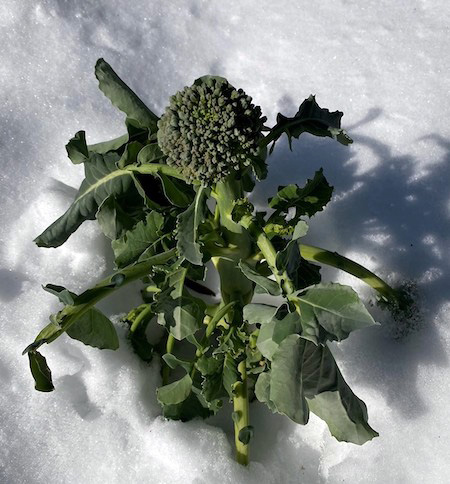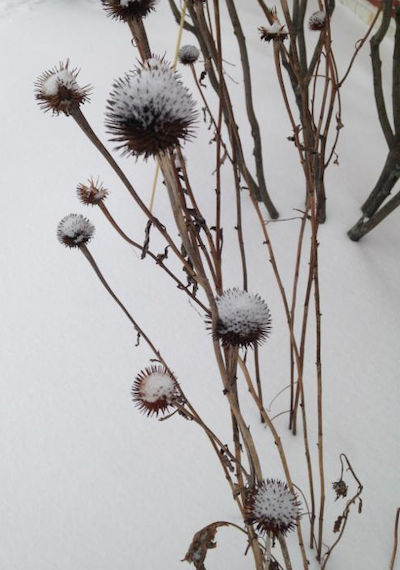It’s Winter — This Year Our Gardens Have A Snow Treat
by Anthony Makara, Fairfax Master Gardener
Oh, the weather outside is freezing
And seed catalogs, so pleasing.
As we think about what to grow,
Let it snow, Let it snow, Let it snow.
(Sung to the tune of “Let It Snow” )

Broccoli in Snow
It’s January 21 in Fairfax VA. The high for today will be below freezing. There’s not a cloud in the sky. After two moderate snowfalls in the past week, gardens are covered with about 3 inches of snow. Who’s not enjoying this snow and cold? Oops, do I see a lot of hands going up?
We certainly should not be complacent as to the safety risks caused by cold temperatures and snowy conditions, especially with the absence of measurable snow over the past two years. And well, cold is cold. That notwithstanding, are there any positives here for the gardener?
As with anything, cold, snowy winter weather can be viewed through a Glass Half Full or a Glass Half Empty lens. For gardeners envisioning another planting season, the first approach has its merits, in light of the ways that frigid cold weather, accompanied by snow, can provide some potential benefits.
While Fairfax County has recently shifted to a slightly warmer hardiness zone (Zone 7b, up from 7a) our herbaceous plants still have to experience winter dormancy. Snow can be an insulator to help prevent excessively cold temperatures from reaching a level to cause root damage. Snow is a great mulch and often benefits some of our perennial plants by protecting their shallow roots, mitigating risks from a “dry” freezing and thawing cycle that could push them toward the surface. And moderately cold and snowy conditions rarely cause damage to cold weather vegetable crops such as kale or broccoli. Snow may even provide beneficial nitrogen, although not enough to forego a regular fertilization plan. Going into this winter, we were coming off the heels of a long drought. Luckily, with the wettest December in quite a while, we now appear to be out of that. But as a follow on bonus, our snowfall is providing us a means to sustain needed moisture in anticipation of the spring planting season.
 Our summer plants stand to benefit as well. Fewer of the known pests that attack our warm-season plants will survive through a winter with several weeks of freezing temperatures. When the time comes to pick our first tomato in July, maybe this cold weather will have prevented a sizeable population of aphids and whiteflies, or others. If so, we can look back in gratitude to freezing days such as today that can potentially afford us a more healthy and plentiful summer garden bounty.
Our summer plants stand to benefit as well. Fewer of the known pests that attack our warm-season plants will survive through a winter with several weeks of freezing temperatures. When the time comes to pick our first tomato in July, maybe this cold weather will have prevented a sizeable population of aphids and whiteflies, or others. If so, we can look back in gratitude to freezing days such as today that can potentially afford us a more healthy and plentiful summer garden bounty.
Okay, this is all great, but aren’t there any drawbacks to plants in cold weather and snowfall? Well, yes there are a few. Snow may offer voles and other pests protection from predators. Rabbits, in search of food in a snow-covered landscape, may be forced to nibble on the bark of newly planted trees, or stems of shrubs. Heavy snow and ice can snap tree branches. (Experts recommend that if snow or ice has to be removed because of the risk of snapping, push upwards.) And to be sure, timing is everything. Benefits shift to real risks in the event of a sudden snap of cold snowy weather in March or April once plants have begun to break dormancy and spring growth has begun.
Still, snowfall and cold temperatures offer us a quiet, almost cleansing feeling when outdoors. In the garden landscape, freshly fallen snow can highlight trees or shrubs with ornamental stems or bark against a picturesque, white background. A good example would be the red-twigged dogwood. And how about the visual appeal of a red cardinal when perched against a snowy backdrop? So, for the time being, I’ll relish the snow and cold. It will be gone all too quickly, and before long we will begin experiencing the heat and sultry humidity that will trigger the usual complaints. (Show of hands?)
Resources
• The Benefits of Snow, Nebraska Extension in Lancaster County
• Cold Temps, Snow Cover and Dormancy, University of Illinois College of Agricultural, Consumer, &
Environmental Services
• How Does Winter Help the Garden?, University of Illinois College of Agricultural, Consumer, & Environmental
Services
• Cold and Freeze Damage to Garden Plants, Iowa State University Extension and Outreach
• And Then It Snowed … Any Free N With That?, University of Minnesota Extension